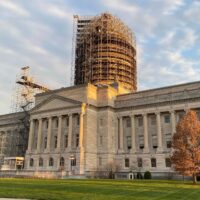Republican state lawmakers and U.S. Sen. Rand Paul are rallying around a yet-to-be-revealed bill that would make changes to Kentucky’s election laws, though it’s unclear what exactly the bill would do.
Rep. Jennifer Decker, a Republican from Waddy and the bill’s sponsor, said Thursday she won’t unveil the contents of the bill to the public or Democratic lawmakers until the day before the bill receives its first vote.
Decker said she has received input from county clerks, the State Board of Elections and current and former GOP officials.
“We combined our list and we’re paring it down in an attempt to include only those ideas that would help advance the goal of enhancing the integrity and trust in our election system,” Decker said.
The Kentucky House Elections, Constitutional Amendments and Intergovernmental Affairs Committee is scheduled to vote on the measure on Tuesday.
Paul joined the state committee via Zoom and threw his support behind the mystery legislation. He said he’s seen the proposal and it would help Kentucky avoid problems that he says happened in other states.
“I think these are things that aren’t criticism of anything you’ve done, or criticism of our government or elections, but just being careful that we don’t slip into what has happened in other states,” Paul said.
Paul listed several election changes he would like to see, including placing limits on secretaries of state from making election changes during states of emergency and forbidding election officials from “soliciting voters.” He also proposed mandating the purging of unqualified voters from the state’s voter rolls, which is already a law in Kentucky.
Much of Paul’s testimony focused on reducing the number of people casting votes by mail.
“Typically, all of you know in the room, mail-in votes were small percentage of votes, and during the pandemic became the majority of votes. To my thinking, I think inherently it’s harder to verify mail-in votes than it is in-person votes,” Paul said.
Republican Secretary of State Michael Adams and Democratic Gov. Andy Beshear last year expanded eligibility for mail-in and early voting during the coronavirus pandemic. The legislature voted to give them the power to do so during last year’s legislative session.
- SUPPORT US: Like what we do? Consider making a donation to the Hoptown Chronicle, a nonprofit news organization
Paul has repeatedly downplayed the seriousness of the pandemic and continues to question the outcome of last year’s presidential election, though he did vote to certify election results hours after the Jan. 6 insurrection at the U.S. Capitol, where rioters killed a Capitol Police officer.
Democratic Rep. Attica Scott asked Paul how Republicans can make sure they “don’t contribute to inciting insurrectionist attacks” in Frankfort when some of their supporters are still claiming there is widespread voter fraud.
Paul responded by equating the U.S. Capitol riot to racial justice protests last year.
“Frankly I think the violence of Jan. 6 was abhorrent, but there was also violence all throughout the summer that many on the Democrat[ic] side did not criticize the violence or try to stop the violence in our cities. We had violence in Louisville, frankly,” Paul said.
“I think there has been violence on both sides and extremists on both sides ought to be condemned.”
Rep. McKenzie Cantrell, a Democrat from Louisville, said Republican sponsors of the yet-to-be-revealed election reform bill “have not been specific at all” about what is in the measure.
“Sen. Paul has said that he has seen some of the proposals from Rep. Decker, yet we did not hear a single specific proposal today about what is going to be in this bill,” Cantrell said.
Rep. James Tipton, a Republican from Taylorsville also supporting the bill, said unveiling the bill ahead of time would “cause a lot of confusion.”
“If you come out and put something out in draft, there might be some comments made that might cause some decision points to be made differently between now and then,” Tipton said.
Lawmakers regularly file bills long before they are voted on in committee to give lawmakers and the public time to review legislation.
House bills are usually required to be posted three days in advance of being heard in committee, but this year the House adopted rules shortening the posting requirement to one day.






